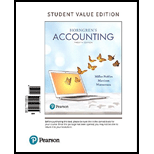
Horngren's Accounting, Student Value Edition (12th Edition)
12th Edition
ISBN: 9780134487151
Author: Tracie L. Miller-Nobles, Brenda L. Mattison, Ella Mae Matsumura
Publisher: PEARSON
expand_more
expand_more
format_list_bulleted
Question
Chapter 9, Problem 15RQ
To determine
Allowance Method:
Under the Allowance Method, the company makes an estimate of debts which may not be realizable. This estimate is based on some past experiences. Since, it is not ascertained as to which customer will not be able to pay the debt, a contra-asset account named Allowance for Bad or Doubtful Debt Account is created. This allowance for bad or doubtful debt account will be shown as a deduction to the
To Determine:
Effect on net realizable value shown on the Balance Sheet when a receivable is written off under the Allowance Method
Expert Solution & Answer
Want to see the full answer?
Check out a sample textbook solution
Students have asked these similar questions
Calculate the company's profit margin??
What is the target price to obtain a 15% profit margin on sales?? General accounting
Kindly help me with accounting questions
Chapter 9 Solutions
Horngren's Accounting, Student Value Edition (12th Edition)
Ch. 9 - 1. With good internal controls, the person who...Ch. 9 - Which of the following is a limitation of the...Ch. 9 - 3. The entry to record a write-off of an...Ch. 9 - Brickman Company uses the allowance method to...Ch. 9 - Brickman’s ending balance of accounts Receivable...Ch. 9 - During the year, Bernard Company had net credit...Ch. 9 - At December 31 year-end, Crain Company has an...Ch. 9 - Using the data in the preceding question, what...Ch. 9 - At year-end, Schultz Company has cash of $11,600,...Ch. 9 - Using the data in the preceding question, assume...
Ch. 9 - What is the difference between accounts receivable...Ch. 9 - List some common examples of other receivables,...Ch. 9 - Prob. 3RQCh. 9 - When dealing with receivables, give an example of...Ch. 9 - What type of account must the sum of all...Ch. 9 - Prob. 6RQCh. 9 - What occurs when a business factors its...Ch. 9 - What occurs when a business pledges its...Ch. 9 - What is the expense account associated with the...Ch. 9 - When is bad debts expense recorded when using the...Ch. 9 - What are some limitations of using the direct...Ch. 9 - Prob. 12RQCh. 9 - Prob. 13RQCh. 9 - When using the allowance method, what account is...Ch. 9 - Prob. 15RQCh. 9 - Prob. 16RQCh. 9 - How do the percent-of-receivables and...Ch. 9 - What is the difference between the...Ch. 9 - In accounting for bad debts, how do the income...Ch. 9 - What is the formula to compute interest on a note...Ch. 9 - Prob. 21RQCh. 9 - Prob. 22RQCh. 9 - Prob. 23RQCh. 9 - Prob. 24RQCh. 9 - Prob. S9.1SECh. 9 - Recording credit sales and collections Learning...Ch. 9 - Applying the direct write-off method to account...Ch. 9 - Collecting a receivable previously written...Ch. 9 - Applying the allowance method to account for...Ch. 9 - Applying the allowance method (percent-of-sales)...Ch. 9 - Applying the allowance method...Ch. 9 - Applying the allowance method...Ch. 9 - Computing interest amounts on notes receivable...Ch. 9 - Accounting for a note receivable Learning...Ch. 9 - Accruing interest revenue and recording collection...Ch. 9 - Recording a dishonored note receivable Learning...Ch. 9 - Prob. S9.13SECh. 9 - Defining common receivables terms Learning...Ch. 9 - E9-15 Identifying and correcting internal control...Ch. 9 - Recording credit sales and collections Learning...Ch. 9 - Journalizing transactions using the direct...Ch. 9 - Accounting for uncollectible accounts using the...Ch. 9 - Accounting for uncollectible accounts using the...Ch. 9 - Accounting for uncollectible accounts using the...Ch. 9 - Prob. E9.21ECh. 9 - Journalizing credit sales, note receivable...Ch. 9 - Journalizing note receivable transactions...Ch. 9 - Journalizing note receivable transactions Learning...Ch. 9 - Journalizing note receivable transactions Learning...Ch. 9 - Evaluating ratio data Learning Objective 5 Abanaki...Ch. 9 - Computing the collection period for receivables...Ch. 9 - Accounting for uncollectible accounts using the...Ch. 9 - Accounting for uncollectible accounts using the...Ch. 9 - Accounting for uncollectible accounts using the...Ch. 9 - Prob. P9.31APGACh. 9 - Accounting for notes receivable and accruing...Ch. 9 - Prob. P9.33APGACh. 9 - Using ratio data to evaluate a company’s financial...Ch. 9 - Accounting for uncollectible accounts using the...Ch. 9 - Accounting for uncollectible accounts using the...Ch. 9 - Prob. P9.37BPGBCh. 9 - Prob. P9.38BPGBCh. 9 - Prob. P9.39BPGBCh. 9 - Accounting for notes receivable, dishonored notes,...Ch. 9 - Using ratio data to evaluate a company’s financial...Ch. 9 - Prob. P9.42CTCh. 9 - Prob. P9.43CPCh. 9 - Prob. P9.44PSCh. 9 - Prob. 9.1TIATCCh. 9 - Decision Case 9-1 Weddings on Demand sells on...Ch. 9 - Decision Case 9-2 Pauline’s Pottery has always...Ch. 9 - Prob. 9.1FCCh. 9 - Financial Statement Case 9-1 Use Target...
Knowledge Booster
Similar questions
arrow_back_ios
SEE MORE QUESTIONS
arrow_forward_ios
Recommended textbooks for you

 AccountingAccountingISBN:9781337272094Author:WARREN, Carl S., Reeve, James M., Duchac, Jonathan E.Publisher:Cengage Learning,
AccountingAccountingISBN:9781337272094Author:WARREN, Carl S., Reeve, James M., Duchac, Jonathan E.Publisher:Cengage Learning, Accounting Information SystemsAccountingISBN:9781337619202Author:Hall, James A.Publisher:Cengage Learning,
Accounting Information SystemsAccountingISBN:9781337619202Author:Hall, James A.Publisher:Cengage Learning, Horngren's Cost Accounting: A Managerial Emphasis...AccountingISBN:9780134475585Author:Srikant M. Datar, Madhav V. RajanPublisher:PEARSON
Horngren's Cost Accounting: A Managerial Emphasis...AccountingISBN:9780134475585Author:Srikant M. Datar, Madhav V. RajanPublisher:PEARSON Intermediate AccountingAccountingISBN:9781259722660Author:J. David Spiceland, Mark W. Nelson, Wayne M ThomasPublisher:McGraw-Hill Education
Intermediate AccountingAccountingISBN:9781259722660Author:J. David Spiceland, Mark W. Nelson, Wayne M ThomasPublisher:McGraw-Hill Education Financial and Managerial AccountingAccountingISBN:9781259726705Author:John J Wild, Ken W. Shaw, Barbara Chiappetta Fundamental Accounting PrinciplesPublisher:McGraw-Hill Education
Financial and Managerial AccountingAccountingISBN:9781259726705Author:John J Wild, Ken W. Shaw, Barbara Chiappetta Fundamental Accounting PrinciplesPublisher:McGraw-Hill Education


Accounting
Accounting
ISBN:9781337272094
Author:WARREN, Carl S., Reeve, James M., Duchac, Jonathan E.
Publisher:Cengage Learning,

Accounting Information Systems
Accounting
ISBN:9781337619202
Author:Hall, James A.
Publisher:Cengage Learning,

Horngren's Cost Accounting: A Managerial Emphasis...
Accounting
ISBN:9780134475585
Author:Srikant M. Datar, Madhav V. Rajan
Publisher:PEARSON

Intermediate Accounting
Accounting
ISBN:9781259722660
Author:J. David Spiceland, Mark W. Nelson, Wayne M Thomas
Publisher:McGraw-Hill Education

Financial and Managerial Accounting
Accounting
ISBN:9781259726705
Author:John J Wild, Ken W. Shaw, Barbara Chiappetta Fundamental Accounting Principles
Publisher:McGraw-Hill Education